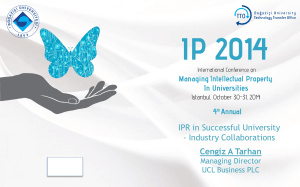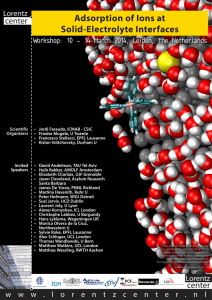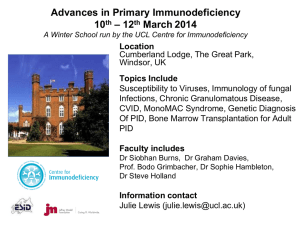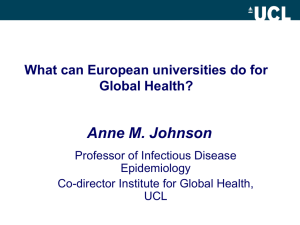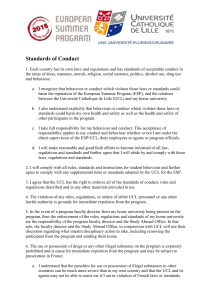UGI Postdoctoral Research Associate/Senior Research Associate in
advertisement
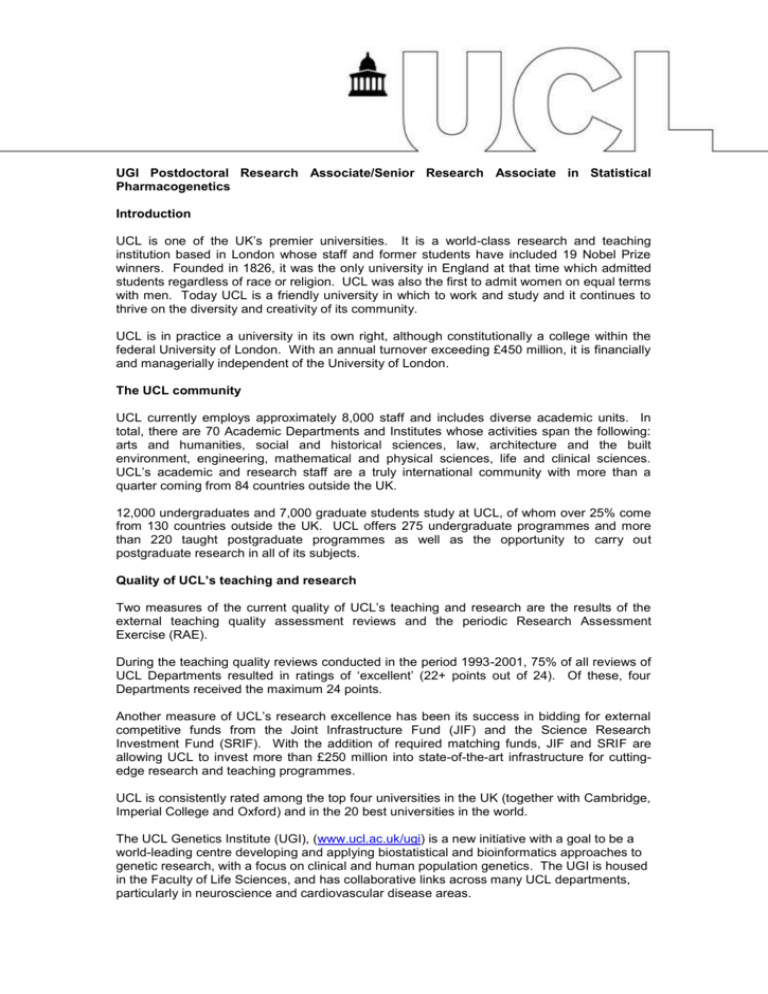
UGI Postdoctoral Research Associate/Senior Research Associate in Statistical Pharmacogenetics Introduction UCL is one of the UK’s premier universities. It is a world-class research and teaching institution based in London whose staff and former students have included 19 Nobel Prize winners. Founded in 1826, it was the only university in England at that time which admitted students regardless of race or religion. UCL was also the first to admit women on equal terms with men. Today UCL is a friendly university in which to work and study and it continues to thrive on the diversity and creativity of its community. UCL is in practice a university in its own right, although constitutionally a college within the federal University of London. With an annual turnover exceeding £450 million, it is financially and managerially independent of the University of London. The UCL community UCL currently employs approximately 8,000 staff and includes diverse academic units. In total, there are 70 Academic Departments and Institutes whose activities span the following: arts and humanities, social and historical sciences, law, architecture and the built environment, engineering, mathematical and physical sciences, life and clinical sciences. UCL’s academic and research staff are a truly international community with more than a quarter coming from 84 countries outside the UK. 12,000 undergraduates and 7,000 graduate students study at UCL, of whom over 25% come from 130 countries outside the UK. UCL offers 275 undergraduate programmes and more than 220 taught postgraduate programmes as well as the opportunity to carry out postgraduate research in all of its subjects. Quality of UCL’s teaching and research Two measures of the current quality of UCL’s teaching and research are the results of the external teaching quality assessment reviews and the periodic Research Assessment Exercise (RAE). During the teaching quality reviews conducted in the period 1993-2001, 75% of all reviews of UCL Departments resulted in ratings of ‘excellent’ (22+ points out of 24). Of these, four Departments received the maximum 24 points. Another measure of UCL’s research excellence has been its success in bidding for external competitive funds from the Joint Infrastructure Fund (JIF) and the Science Research Investment Fund (SRIF). With the addition of required matching funds, JIF and SRIF are allowing UCL to invest more than £250 million into state-of-the-art infrastructure for cuttingedge research and teaching programmes. UCL is consistently rated among the top four universities in the UK (together with Cambridge, Imperial College and Oxford) and in the 20 best universities in the world. The UCL Genetics Institute (UGI), (www.ucl.ac.uk/ugi) is a new initiative with a goal to be a world-leading centre developing and applying biostatistical and bioinformatics approaches to genetic research, with a focus on clinical and human population genetics. The UGI is housed in the Faculty of Life Sciences, and has collaborative links across many UCL departments, particularly in neuroscience and cardiovascular disease areas. UGI Postdoctoral Research Associate/Senior Research Associate in Statistical Pharmacogenetics Background The post is funded by a grant from the Methodology Research Programme of the Medical Research Council and the National Institute for Health Research. Pharmacogenetics holds great promise to improve patient care through faster and more effective dosing of existing drugs, making accessible a wider range of effective drugs, and reducing the adverse events arising from drug use. However, although there have been some notable successes, for example in prediction of adverse drug reactions, there has been very limited progress in the prediction of therapeutic drug response (efficacy pharmacogenetics) and methods for implementing this approach are under-explored. One of the limiting factors has been the ability to recruit sufficient patients receiving similar treatments and manifesting specific responses of interest. Attempts to increase recruitment inevitably risk problems with heterogeneity of individuals, of treatment and of response. The goal of our research is to develop better statistical methods to deal with these problems, and hence to improve the prospects of pharmacogenetics. The primary focus will be to develop Bayesian methods for use in pharmacogenetics, particularly for meta-analyses and to analyse multivariate phenotype data. These methods will be applied to several internationally unique pharmacogenetic datasets, including genome-wide-genotyped prospective cohorts of drug response in epilepsy and Parkinson’s disease. The postholder will be expected to work closely with our clinical collaborators to develop novel statistical methods of prediction from genetic markers and available covariate data and to implement them in efficient and user-friendly software for ultimate use in clinical practice. The project offers an opportunity to develop statistical methods in a novel and important field of genomic research. Job Description The position is a Postdoctoral Research Associate in Statistical Pharmacogenetics in the UCL Genetics Institute. The appointee is responsible for carrying out academic duties as required by the Head of Department The successful applicant will be expected to develop statistical methods relevant to pharmacogenetics, particularly for predicting drug response from heterogeneous datasets, and conducting meta-analyses. The methods developed will be made available in efficient statistical software and applied to the analysis of available pharmacogenetics datasets. The postholder will work with clinical collaborators to help implement innovative analyses of their pharmacogenetics data. The project offers an opportunity to make an important contribution to a fast-developing and important field of genomic research. Standard UCL conditions of employment will apply, including actively following UCL policies including 'Equal Opportunities' and maintaining an awareness and observation of Fire and Health & Safety Regulations. As duties and responsibilities change and develop the job description will be reviewed and be subject to amendment in consultation with the post holder. Duties and responsibilities may be amended by the Principal Investigator as necessary, in consultation with the postholder The post holder will be appointed to a grade on the basis of skills and experience. For appointment at the Senior Research Associate grade (8), the post holder will be expected to display continuously high levels of performance in all the above areas commensurate with the level to which they are appointed. Individuals have no automatic right of progression to higher grades. Person Specification Requirements 1. Criteria E / D* Assessed A / I* Knowledge Base 2. Understanding of modern statistical and computational methods used for genetics data E A/I Basic knowledge of genetics and appreciation of issues relevant to pharmacogenetics E A/I Knowledge of Bayesian statistical methods D A/I Ability to program effectively in a language such as C, Java or R E A/I Good interpersonal, oral and written communication skills. E A/I Ability to prepare research publications E A/I E A E A Ability to work collaboratively and flexibly E I Ability to work independently, but in close liaison with other members of a team E I Ability to work with individuals from different disciplines and at all levels of seniority E I Skills 3. Qualifications PhD or equivalent experience in statistics, computer science, bioinformatics, population genetics, or related field 4. Previous Experience: Development and application of computational/statistical methods. In order for the applicant to be appointed as Senior Research Associate, they must have demonstrable experience equivalent to this level. This must be conveyed in the application and following this at interview. 5. Personal Attributes: * E = Essential; Conditions of Appointment D = Desirable; A = Application; I = Interview Appointment The post is at Grade 7 (salary range £31,778 to £40,634, including London Allowance); starting salary will be dependent on successful candidate’s skills and knowledge relevant to the post. Cost of living pay awards are negotiated nationally and are normally effective from 1st August each year. Tenure At least 3 years. Depending on starting salary a longer contract may be available, up to a maximum of 4 years. Probation Appointments are subject to receipt of satisfactory references and a probationary period of 9 months. All staff may be subject to pre-employment health screening by UCL’s Occupational Health Screening Service before their probationary period can be confirmed. Period of notice to resign 3 months Hours of Work The notional working week for full time staff is 36.5 hours. Holidays Annual leave is 27 working days for a full time member of staff. UCL also closes for a period at Christmas and Easter, at which times staff benefit from a total of 6 ‘closure days’ in addition to Bank Holidays. Pension The post holder will be eligible to join the Universities Superannuation Scheme, which is a final salary scheme with a current employee contribution rate of 6.35% and an employer contribution rate of 14% of salary. Season Ticket Loans A season ticket loan is available to staff who have successfully completed their probationary period with the facility to repay through a monthly deduction from salary. Other Benefits Other benefits of joining UCL as a staff member are many and include: Access to an extensive range of in-house staff development opportunities. Staff have full use of the UCL libraries and UCL operates a Study Assistance Scheme for those undertaking part-time work-related study. An excellent location for transport networks being near Euston, Kings Cross and St. Pancras stations and a choice of underground stations connected to London’s other mainline stations. A wide range of bus routes serves the area. UCL lies in Bloomsbury, just north of Oxford Street, Covent Garden and the heart of the West End with access to shops, theatres, cinemas, bars and restaurants. UCL also has its own 550 seat West End arts venue (Bloomsbury Theatre) which hosts drama, dance, music, debates and lectures during the year The main campus has subsidised cafeterias/bars and shops, gym, hairdresser and a travel agent. UCL staff can also benefit from corporate membership at a Tottenham Court Road gym. Equal Opportunities Our policy includes the provision that in recruitment, the only consideration must be that the individual meets or is likely to meet the genuine requirements of the job. No one will be discriminated against on the basis of gender, age, race, colour, ethnic origin, physical disability, marital status, sexual orientation, caring or parental responsibilities, or belief in any matters including religion and politics. The full policy statement can be found at: http://www.ucl.ac.uk/hr/docs/equal_opportunity.php General Information: Please note that, within reason, the duties and role of the post-holder may be changed after appropriate consultation in response to changing organisational requirements. The postholder will be eligible to join a contributory occupational pension scheme. All staff must maintain an awareness and observation of Fire and Health & Safety Regulations. They should actively follow all UCL policies including Equal Opportunities, attend staff meetings and undertake such training as is required by the post. Data Protection UCL is required by law to comply with the Data Protection Act, 1998. It is the commitment of UCL to ensure that every current employee and registered student complies with this Act to ensure the confidentiality of any personal data held by the College, in whatever medium, through its Data Protection Policy. Employees are authorised, if required to do so, to obtain, process and/or use personal information whether held on a computer or on manual paper files in a fair and lawful way and in accordance with data subjects’ rights. Date should be held only for the specific registered purpose and not disclosed in anyway incompatible with such purpose. It should be adequate, relevant and not excessive, accurate and where necessary up to date and kept for no longer than necessary. It should only be disclosed to authorised organisations as instructed and should not be transferred without adequate protection. UCL and all staff or others who process or use any personal information must ensure that they follow these principles at all times. Health & Safety Employees must be aware of the responsibilities placed on them under the Health & Safety at Work Act (1 974) and Fire Regulations, to ensure that the agreed safety procedures are carried out to maintain a safe environment for employees and visitors. No Smoking UCL operates a No Smoking Policy, which does not allow smoking anywhere on College premises. APPLICATIONS PROCEDURE Informal Enquiries: may be made to Professor David Balding, Professor of Statistical Genetics on d.balding@ucl.ac.uk Applications: Closing date: 15 June 2010 Interview date: It is hoped to interview short-listed candidates on or around 22 June 2010 References: will be taken up for all short-listed candidates. A reference will be required from the immediate employer for the person appointed. Applicants who would prefer that we did not contact their employer at the initial stage of interviews should state this clearly in their application and provide the name/address of an alternative referee. We are unfortunately unable to reply to those applicants who have not been shortlisted and invited for interview. However, we would like to thank all candidates for their applications and for their interest in the UCL Institute of Genetics.



